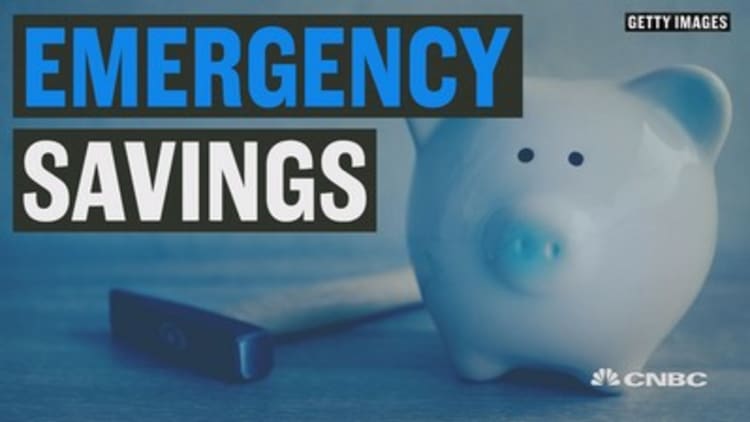
An emergency fund shouldn't be your only financial fail-safe.
More than half of households experienced a financial shock in 2015, according to a new report from The Pew Charitable Trusts. Repairing or replacing a vehicle was the most common emergency (affecting 29 percent of households), followed by major home repairs (20 percent), an illness or injury requiring a trip to the hospital (20 percent) and a loss of income (20 percent).
Researchers found that while having savings helped, it wasn't a cure-all.
Half of the families who had at least $2,000 in savings — enough to cover the median emergency expense — still reported struggling afterward, versus 70 percent of those who had less than $2,000 on hand. Even among those with at least $4,000 saved, 44 percent said they experienced financial challenges after an emergency expense.
Beefing up your emergency fund is still your best recourse to soften the blow of a financial emergency, said Carolyn McClanahan, director of financial planning for Life Planning Partners in Jacksonville, Florida. Ideally, you'd aim for three to six months of living expenses set aside, but even a little bit of savings can reduce your reliance on credit cards.
"You want to have money set aside in case something happens," she said.
Beyond that rainy-day money, these four precautions can help you better weather common financial shocks:
1) Plan for known expenses
Not all financial emergencies pop up out of the blue. If you see an expense on the horizon — say, an aging appliance starting to act up, or a pending shift in income from maternity leave — start setting aside money specifically to handle that, McClanahan said.
"If you're a homeowner, you need to anticipate in your budget that something is going to happen with your house," she said. "Budget a certain amount each year, and put it in savings."
Avoid surprises by asking about upcoming expenses when you buy a home or car. A home inspection might note the remaining life on features like the roof or water heater before they need replacing, for example. When you buy a used car, a trusted mechanic can offer an early warning on parts that may need to be repaired or replaced in the near term, said Matt DeLorenzo, managing editor for Kelley Blue Book.
2) Apply for a HELOC
If you own your home, set up a home equity line of credit, McClanahan said. Do it before you need it — especially if you're looking to make a big home improvement or repair.
It's a measure McClanahan wishes she'd put in place before starting a home renovation in 2014. A contractor noticed an area in the bedroom closet that looked unusual, and subsequent investigation revealed termite damage to the tune of $250,000.
"My house was eaten by termites," she said. "We basically had to gut it and start over."
McClanahan said her bank was unwilling to open a HELOC because construction was already underway. Unable to tap her home equity, she had to dip into other savings and sell investments to help cover the out-of-pocket costs of the repairs.
3) Conduct an insurance review
Make sure there aren't any gaps in your homeowners, auto or life insurance coverage that could leave you on the hook for a bigger bill.
Auto insurance: Drivers with a new car or a lease might consider so-called gap insurance, which covers the difference between what you owe on a lease or loan and what the insurance company will pay if your vehicle is considered a total loss, DeLorenzo said. There can be a substantial gap if you have long-term financing, or have picked a pricier car.
"The more expensive the vehicle, the more quickly it depreciates," he said.
Buying used? Be careful about dropping comprehensive coverage, said Loretta Worters, a vice president for the Insurance Information Institute. It's a move that drivers use to cut premiums, but leaves you uncovered for a wide range of problems, including hail damage, theft of your vehicle and flood losses.
"They'll have to pay that out of pocket, and that can be quite a large amount of money," she said.
Life insurance: The big gaps here are not having enough coverage, or not having coverage, period. If you're in a relationship where you and your partner depend on each other's income or where you have dependents, life insurance is a smart move, McClanahan said.
Homeowners insurance: Look through your policy to make sure you aren't underinsured, or are lacking extra coverage for floods or earthquakes if you live in an at-risk area, Worters said.
When it comes to your possessions, make sure you're covered for their replacement value, rather than their actual cash value, she said. The latter factors in depreciation — meaning you'd only get back a fraction of what you originally paid for that couch or TV. Ask about riders to cover expensive items like jewelry or electronics.
Impact of a financial shock in days of income
| Percentile | 2014 Total | 2015 Total |
|---|---|---|
| 25th percentile | 6 | 5 |
| 50th percentile | 16 | 14 |
| 75th percentile | 45 | 43 |
Source: Source: 2017 The Pew Charitable Trusts
4) Pick up extra coverage
Certified preowned cars tend to be pricier than other used cars, but they also tend to be in better shape thanks to a rigorous inspection process, DeLorenzo said. Manufacturers often also throw in valuable perks like an extended warranty and roadside assistance, helping you reduce or avoid bills if repairs are needed.
Drivers might also consider a membership to AAA or other roadside assistance coverage. Joining can pay for itself in one use.
"A big towing bill could add almost double the cost of a small repair," he said. "You have to look at it from a strategic point of view."






